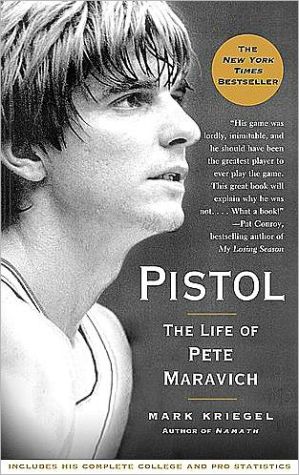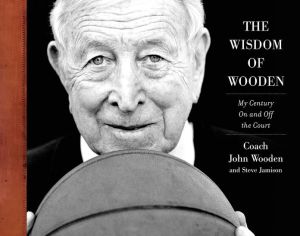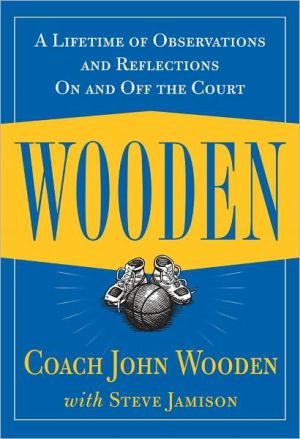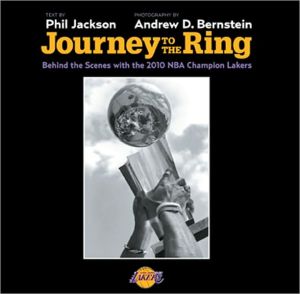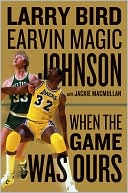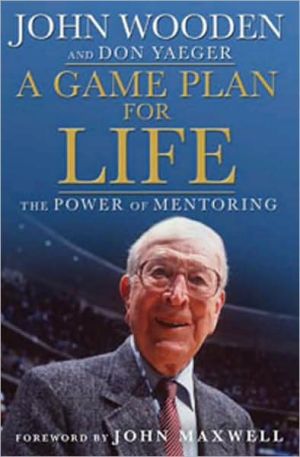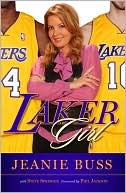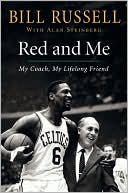Pistol: The Life of Pete Maravich
Pistol is more than the biography of a ballplayer. It's the stuff of classic novels: the story of a boy transformed by his father's dream — and the cost of that dream. Even as Pete Maravich became Pistol Pete — a basketball icon for baby boomers — all the Maraviches paid a price. Now acclaimed author Mark Kriegel has brilliantly captured the saga of an American family: its rise, its apparent ruin, and, finally, its redemption.\ Almost four decades have passed since Maravich entered the...
Search in google:
Pistol is more than the biography of a ballplayer. It's the stuff of classic novels: the story of a boy transformed by his father's dream—-and the cost of that dream. Even as Pete Maravich became Pistol Pete—-a basketball icon for baby boomers—-all the Maraviches paid a price. Now acclaimed author Mark Kriegel has brilliantly captured the saga of an American family: its rise, its apparent ruin, and, finally, its redemption. Publishers Weekly As he did for another larger-than-life sports star whose achievements in his game were always shadowed by his demons outside of it, Kriegel (Namath) offers a rounded, insightful look at one of basketball's enigmatic icons. Kriegel presents Pete Maravich (1947 1988) as a "child prodigy, prodigal son, his father's ransom in a Faustian bargain." His father, Press Maravich, was the poor son of Serbian immigrants to Pennsylvania, a man obsessed with basketball as a means of personal and financial redemption. His rise as a coach loomed over Pete, who described himself as a boy as "a basketball android." A veteran sportswriter, Kriegel is more than up to the task of eliciting Pete's on-court greatness and describing basketball action in a fluid, dramatic fashion (Pete's deadeye shot earned him the nickname "Pistol"). But the book is more notable for how Kriegel evokes Press's support turning into suffocation, and the effect of the impossible expectations on Pete (he played for Louisiana State, then later for the New Orleans Jazz). In the end, Kriegel's portrait is a sad celebration of a gifted player whose collegiate legend never quite blossomed into professional greatness as he battled alcoholism, sought solace in religion and left a troubled legacy that's still felt by his children and those who knew him. (Feb.)Copyright 2006 Reed Business Information.
Prologue\ January 5, 1988.\ They cannot see him, this slouched, ashen-faced man in their midst. To their oblivious eyes, he remains what he had been, unblemished by the years, much as he appeared on his first bubblegum card: a Beatlesque halo of hair, the fresh-faced, sad-eyed wizard cradling a grainy, leather orb.\ One of the regulars, a certified public accountant, had retrieved this very artifact the night before. He found it in a shoebox, tucked away with an old train set and a wooden fort in a crawlspace in his parents' basement. He brought it to the gym this morning to have it signed, or perhaps, in some way, sanctified. The 1970 rookie card of Pete Maravich, to whom the Atlanta Hawks had just awarded the richest contract in professional sport, notes the outstanding facts: that Maravich had been coached by his father, under whose tutelage he became "the most prolific scorer in the history of college basketball."\ Other salient statistics are provided in agate type: an average of 44.2 points a game, a total of 3,667 (this when nobody had scored 3,000). The records will never be broken. Still, they are woefully inadequate in measuring the contours of the Maravich myth.\ Even the CPA, for whom arithmetic is a vocation, understands the limitation in mere numbers. There is no integer denoting magic or memory. "He was important to us," the accountant would say.\ Maravich wasn't an archetype; he was several: child prodigy, prodigal son, his father's ransom in a Faustian bargain. He was a creature of contradictions, ever alone: the white hope of a black sport, a virtuoso stuck in an ensemble, an exuberant showman who couldn't look you in the eye, a vegetarian boozer, the athlete who lived like a rock star, a profligate, suicidal genius saved by Jesus Christ.\ Still, it's his caricature that evokes unqualified affection in men of a certain age. Pistol Pete, they called him. The Pistol is another relic of the seventies, not unlike bongs or Bruce Lee flicks: the skinny kid who mesmerized the basketball world with Globetrotter moves, floppy socks, and great hair.\ Pistol Pete was, in fact, his father's vision, built to the old man's exacting specifications. Press Maravich was a Serb. Ideas and language occurred to him in the mother tongue, and so one imagines him speaking to Pistol (yes, that's what he called him, too) as a father addressing his son in an old Serbian song: Cuj me sine oci moje, Cuvaj ono sto je tvoje...Listen to me, eyes of mine, guard that which is thine...\ The game in progress is a dance in deference to this patrimony. The Pistol is an inheritance, not just for the Maraviches, but for all the American sons who play this American game. The squeak of sneakers against the floor produces an oddly chirping melody. Then there's another rhythm, the respiration of men well past their prime, an assortment of white guys: the accountant, insurance salesmen, financial planners, even a preacher or two. "Just a bunch of duffers," recalls one. "Fat old men," smirks another.\ But they play as if Pistol Pete, or what's left of him, could summon the boys they once were. They acknowledge him with a superfluous flourish, vestigial teenage vanity — an extra behind-the-back pass or an unnecessary between-the-legs dribble. The preacher, a gentle-voiced man of great renown in evangelical circles, reveals a feverishly competitive nature. After hitting a shot, he is heard to bellow, "You get that on camera?"\ The Parker Gymnasium at Pasadena's First Church of the Nazarene could pass for a good high school gym — a clean, cavernous space with arching wooden rafters and large windows. At dawn, fully energized halogen lamps give off a glow to the outside world, a beacon to spirits searching for a game. As a boy, Maravich would have considered this a kind of heaven. Now, it's a way station of sorts.\ Pete begins wearily. He hasn't played in a long time and moves at one-quarter speed, if that. He does not jump; he shuffles. The ball seems like a shotput in his hands, his second attempt at the basket barely touching the front of the rim.\ But gradually, as the pace of his breath melds with the others' and he starts to sweat, Pete Maravich recovers something in himself. "The glimpse of greatness was in his ballhandling," recalls the accountant. "Every once in a while the hands would flicker. There would just be some kind of dribble or something. You could see a little of it in his hands, the greatness. Just the quickness of the beat."\ There was genius in that odd beat, the unexpected cadence, a measure of music. The Pistol's talent, now as then, was musical. He was as fluent as Mozart — his game rising to the level of language — but he was sold like Elvis, the white guy performing in a black idiom. And for a time, he was mad like Elvis, too.\ Once, in an attempt to establish contact with extraterrestrial life, he painted a message on his roof: "Take me."\ Deliver me, he meant.\ Now the accountant tries to blow past Pete with a nifty spin move. Pete tells him not to believe his own hype.\ The Pistol wears an easy grin. The men in this game are avid readers of the Bible. But perhaps the truth of this morning is to be found in the Koran: "Remember that the life of this world is but a sport and a pastime."\ Pete banks one in.\ That smile again. What a goof.\ The game ends. Guys trudge off to the water fountain. Pete continues to shoot around.\ And now, you wonder what he sees. Was it as he used to imagine? "The space will open up," he once said. "Beyond that will be heaven and when you go inside, then the space closes again and you are there...definitely a wonderful place...everyone you ever knew will be there."\ Back on earth, the preacher asks Pete Maravich how he feels.\ "I feel great," he says.\ Soon the phone will ring in Covington, Louisiana. A five-year-old boy hears the maid let out a sharp piercing howl. Then big old Irma quickly ushers the boy and his brother into another room. The boy closes the door behind him and considers himself in the mirror. He has his father's eyes. That's what everyone says. Eyes of mine, guard that which is thine. Guard that which fathers give to their sons to give to their sons.\ The boy looks through himself, and he knows:\ "My daddy's dead."\ Copyright © 2007 by Mark Kriegel
Prologue 1Special Opportunity 5Mr. Basketball 15Pro Ball 29The Cult of Press 41Country Gentlemen 53The Basketball Gene 63The Devil in Ronnie Montini 71"Pistol Pete" 77Changing the Game 87The Deep End 103King of the Cow Palace 119Showtime 129One of Us 153Marked Man 167The Blackhawks 179The Unbearable Whiteness of Being Pete 193Take Me 211Smothered 229All That Jazz 237The Loser 259Take Me, Part 2 273Amazing Grace 293Patrimony 299Pete Maravich: The Numbers 325Notes 337Acknowledgments 373Index 379
\ From Barnes & Noble"Pistol" Pete Maravich (1947-88) sported floppy socks and a bushy head of hair, but on a basketball court he could defy the laws of physics. Even before he reached college, his feats were legend. Long before the 3-point rule, he scored 3,667 points in his three varsity years at Southeastern Louisiana College, setting one of many NCAA records that he still holds. "Pistol" wasn't just a shooting phenom; his dribbling and passing skills were also unexcelled. In the NBA, he was a five-time All-Star, but his virtuosity grated against team-oriented systems. Off the court, Maravich was an eccentric, often reclusive outsider. After injury forced his retirement in 1980, he sank into alcoholism and depression. He had just settled peacefully into his conversion to evangelical Christianity when a heart attack struck him down while he was playing in a church pickup game. Mark Kriegel's biography places Maravich's bumpy journey and astonishing accomplishments in bold relief.\ \ \ \ \ Publishers WeeklyAs he did for another larger-than-life sports star whose achievements in his game were always shadowed by his demons outside of it, Kriegel (Namath) offers a rounded, insightful look at one of basketball's enigmatic icons. Kriegel presents Pete Maravich (1947–1988) as a "child prodigy, prodigal son, his father's ransom in a Faustian bargain." His father, Press Maravich, was the poor son of Serbian immigrants to Pennsylvania, a man obsessed with basketball as a means of personal and financial redemption. His rise as a coach loomed over Pete, who described himself as a boy as "a basketball android." A veteran sportswriter, Kriegel is more than up to the task of eliciting Pete's on-court greatness and describing basketball action in a fluid, dramatic fashion (Pete's deadeye shot earned him the nickname "Pistol"). But the book is more notable for how Kriegel evokes Press's support turning into suffocation, and the effect of the impossible expectations on Pete (he played for Louisiana State, then later for the New Orleans Jazz). In the end, Kriegel's portrait is a sad celebration of a gifted player whose collegiate legend never quite blossomed into professional greatness as he battled alcoholism, sought solace in religion and left a troubled legacy that's still felt by his children and those who knew him. (Feb.)\ Copyright 2006 Reed Business Information.\ \ \ Library JournalThis reviewer was a young child when "Pistol" Pete Maravich (1947–88) was performing his awe-inspiring exploits on the college hardwood. Reading Pistolwill surely bring back memories among his fans and, for younger readers who know too little of this man who predated rampant TV sports programming, this is also an essential read. His amazing 44.2 points per game—before the three-point era—at Louisiana State University is still an NCAA record. His nickname was owing to his unerring aim at the basket as well as in passing. Maravich's professional career (1970–80) with the Hawks, Jazz, and Celtics included five All-Star appearances and was followed by induction into the NBA Hall of Fame in 1987. Kriegel (former sports columnist, New York Daily News; Namath) not only provides a wonderful evocation of the basketball life of Maravich, but he also gives readers a delightfully written biography. Included are important stories about Maravich's relationship with his driven father, "Press" Maravich, a Serbian immigrant to the United States who lived to coach basketball (including his son at LSU), and the sad story of the athlete's decline. Readers of all ages, sports fans or not, will thoroughly appreciate this book. Highly recommended for all libraries.\ By Daniel Lombardo, formerly with Jones Lib., Amherst, MA\ \ —Tim Delaney\ \ \ \ \ Kirkus ReviewsThe bittersweet tale of Pistol Pete, one of basketball's most talented and tragic legends. Pete Maravich, born in 1947, was groomed from birth to be the best basketball player of all time. His father, Press, was his coach and taskmaster; the pair functioned as extensions of each other. Kriegel (Namath, 2004) begins by expounding at length on Press's hardscrabble youth, when basketball became his salvation and his life. Press imbued his son with every ounce of his ambition. It didn't take long for Pete, fanatical about perfecting every drill he was taught, to display an almost preternatural affinity for basketball. Pistol Pete integrated flawless fundamentals with showy moves. As his legend grew and he became the "great white hope" of the NBA, the weight of expectations crushed his free spirit, which was further battered by his mother's 1974 suicide. His thin frame began to break down, and old-school coaches who didn't appreciate Pete's talent lessened his competitive fire. He sought comfort in everything from alcohol to belief in extraterrestrials. Despite spurts of brilliance and a reputation as one of the most talented players of all time, he walked away from the NBA in 1980, after ten seasons, with no championship ring. He would find happiness in Jesus and his family until a heart attack during a pickup match ended his life at the age of 40. Kriegel occasionally lingers too long on Press, but his son emerges in this compelling, nuanced account as a man both talented and complex. Sure to send readers in search of the highlight reel.\ \ \ \ \ From the Publisher"A delightfully written biography . Highly recommended" —-Library Journal\ \
